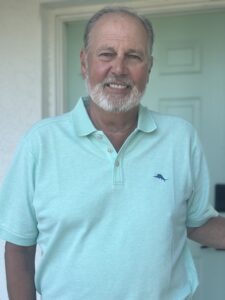EASTHAM — There are two separate races for select board this year: a three-year seat, for which incumbent Jamie Demetri has filed for re-election, and a two-year seat to complete the term of Art Autorino, who died suddenly in February.
Robert Bruns, chair of Eastham’s Zoning Board of Appeals, is the only candidate for Autorino’s seat. No one filed to run against Demetri.
Both candidates will appear on the town’s May 21 ballot, and barring a write-in campaign both are likely to be elected.
Demetri: ‘Time to Do Something’
Demetri, 44, was first elected to the select board in 2018, spurred to run by the election of Donald Trump.

“I never envisioned myself in any type of political role,” she said. “But I felt the country was moving into a very unstable space, and it was time to step up and do something about the instability.”
Since then, Demetri has carved a niche as an advocate for working people. She is especially proud of the town’s vote for the Family Support Package in 2020, which instituted free preschool and free school lunches.
Demetri is working closely with the Task Force on Residential Zoning and Regulation to create guidelines for short-term rentals, she said — work that will appear on this year’s town meeting warrant.
She was born in Eastham and raised in Orleans, and much of her work seeks to maintain “the Cape Cod way of life” that she grew up with. She wants workers to be able to afford to live here year-round and raise their children in the woods and by the ocean.
“Cape Cod isn’t a playground for a second home, it’s our home,” she said. “It’s my commitment to make sure it continues being treated like a home and not a vacation rental.”
Demetri seeks to represent those who have to “maximize their time to pay their bills” and are unable to serve on boards or committees, she said. She points to the energy stretch code passed in 2021, which requires all new construction to adhere to energy efficiency standards.
“The code sounds good, but with every decision I try to think about the ripple effect,” Demetri said. Even though the code would decrease emissions, Demetri notes its financial burden on residents who are struggling to get by.
She sees the adoption of the residential tax exemption (RTE) as a “tool in our toolbox to help our year-round residents.” Eastham is the only town on the Outer Cape not to have implemented the RTE, which lowers the tax burden for most year-round residents while raising the overall residential tax rate.
It was last considered by the select board on Jan. 29, when it failed on a two-to-two vote. Autorino had voted no; Demetri had voted yes.
“Our year-round residents need all the help they can get to keep their homes,” she said.
After graduating from Nauset Regional High School, Demetri went to Tulane University and then moved to Boston, where she worked as a mental health therapist at Bournewood Hospital.
“I hit a wall living in the city and realized that I missed the Cape,” she said.
She moved to Eastham in 2005 and began working at the Pump House Surf Shop in Orleans, becoming manager in 2007. Her parents owned the Eastham sports bar Jimmy D’s until 2006; before that, her grandparents had run it as the Sandpiper.
Demetri said that keeping working people and families on the Cape is a puzzle with many interlocking parts. One is creating “attainable housing” for people whose incomes are just over the federal threshold for affordable housing. Another is creating more places for townspeople to interact.
“I have this daydream of a building that has the Council on Aging and an after-school program coexisting in the same space,” she said. “It would allow the elders to interact with the young people.”
Bruns: ‘I Need Data’
Bruns, 68, worked in computer systems for decades, and his thinking is measured and meticulous. He can recite the exact date and time he retired from his job at Ultimate Software: 2:30 p.m. on March 3, 2017.

“This is the way I am — I’m a Libra; I need things in balance,” he said. “I need data, and then I need intuition, gut feel.”
Bruns moved to Eastham in 2016, but he, his wife, and three children have been vacationing here since the late 1980s, he said. Like many others, they came for the beaches. He said he hopes to bring climate change and the maintenance of beaches to the forefront.
Bruns joined the ZBA in 2017 during a “very contentious time,” he said. The town was working to develop the Village at Nauset Green and purchase the T-Time property. “It was trial by fire,” he said, “but it was a good way to cut my teeth.”
Bruns has served as chair of the ZBA since July, where he said the town’s strategic plan guides every choice he makes, as does a spirit of “neighborliness.”
“I try to treat everyone like my neighbor, because they are,” he said.
Bruns said he is concerned about the “gentrification problem”: longtime residents can no longer afford to live in Eastham and are pushed out. He attributes that in part to the rise in property taxes, currently $7.01 per $1,000 of assessed value, or $5,667 for the average single-family home.
He is concerned that there will be “more increases in taxes down the road that are not necessarily discretionary expenses” but more like the necessary renovation of Nauset Regional High School.
“Education is a social contract,” he said. “Our parents took care of us and our school system when we were growing up. There are things you have to spend money on, and one of those is education.”
Bruns said that while he might lean toward supporting the RTE, he “needs to know more about why it lost. I don’t know enough about both sides of the issue to decide where I stand on it.”
While Bruns said that taxes are a central focus, other issues like planning for the town’s aging population are also top of mind. He thinks the town will add more full-time residents over the next 10 years as more people choose it for retirement.
“I think we’re going to end up with more business in the community that seniors would be interested in patronizing,” Bruns said, “which will also mean a larger full-time workforce.”
Bruns said he does not take lightly that he is running to finish Autorino’s term. “If I could do one-tenth of what Art did, then I would be successful,” he said.
